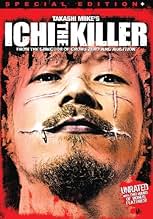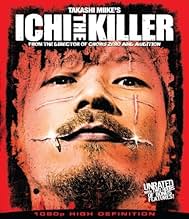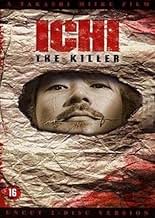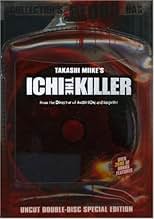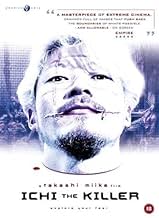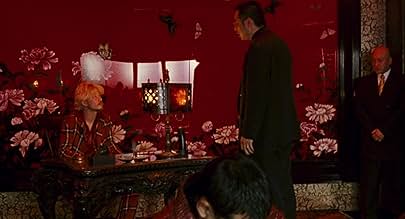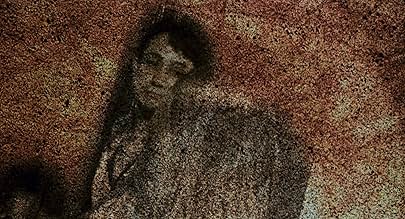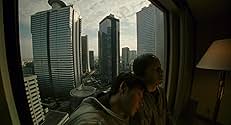NOTE IMDb
6,9/10
63 k
MA NOTE
Alors que l'exécuteur sadomasochiste et yakuza, Kakihara, cherche son patron disparu, il rencontre Ichi, un tueur réprimé et psychotique qui peut être capable d'infliger des niveaux de doule... Tout lireAlors que l'exécuteur sadomasochiste et yakuza, Kakihara, cherche son patron disparu, il rencontre Ichi, un tueur réprimé et psychotique qui peut être capable d'infliger des niveaux de douleur que Kakihara n'a que rêvé d'atteindre.Alors que l'exécuteur sadomasochiste et yakuza, Kakihara, cherche son patron disparu, il rencontre Ichi, un tueur réprimé et psychotique qui peut être capable d'infliger des niveaux de douleur que Kakihara n'a que rêvé d'atteindre.
- Réalisation
- Scénario
- Casting principal
- Récompenses
- 6 victoires et 4 nominations au total
Avis à la une
Ichi the Killer is definitely not a film for people who have weak stomachs or who are easily offended. This film contains some of the most shocking images you'll ever see and includes some very disturbing characters that won't be forgotten in a hurry. It is always a very brave move for a film maker when they decide to adapt from a manga as manga often has aspects within it that can not be replicated in to a live picture. Takashi Miike makes the transition possible and blows away all walls of reality with an outstanding and totally unforgettable film.
The plot involves Yakuza boss Anjo going missing with a huge stash of cash, his gang members investigate and a classic game of cat and mouse is involved. This seems simple enough but what is out of the ordinary is that the leader of the investigation, Kakihara (Tadanobu Asano), is a major masochist and Anjo's killer, Ichi (Nao Omori) is the ultimate sadist with a tormented soul. This is where Ichi the Killer's shocking and graphic imagery really come in to force. Miike is uncompromising in his approach with regards to what he delivers on screen. There are no subtleties, no off camera goings on; it is all there for the audience to see, in full detail! The torture scenes, and their results, are especially horrific. If this film had been made in America or Europe, it would have been banned within a second of being made, it's that graphic. What disturbed me more than the disgusting imagery however, were the characters. Ichi's character I found genuinely terrifying as whilst he often comes across as a cartoonish character, there is a disturbingly real quality to his character. Ichi's childlike naivety draws many parallels to past psychotic killers that have existed in real life and his sexual excitement at causing pain and death is incredibly unsettling. Also unsettling is the character of Kakihara. His badly scarred face and clips either side of his lips immediately make him appear a scary figure and the only thing more disturbing than his pleasure for torturing others and watching their pain is his unparalleled love for being beaten and tortured himself.
What I like about many Asian films is that the acting is often very good and Ichi the Killer is no exception. Tadanobu Asano is brilliant as Kakihara. His performance is charismatic and terrifying, he does a great job of making the role his own. Nao Omori plays Ichi perfectly. The way that he can act tormented, childish and merciless all in one scene is incredible to watch and, as I said before, gives the film a genuinely disturbing edge rather than just immense gore. Alien Sun is very sexy as Karen and the way she speaks more than one language in an almost random fashion adds further mystery to this film. The fact that Karen is the only character who has Ichi's past explained to her from Jijii makes the audience able to empathise with her character more than anyone else. Shinya Tsukamoto is also very good as Jijii. His character is unravelled throughout the film and Tsukamoto is very convincing in his portrayal of what turns out to be a very complex character.
The purpose of this film is to shock and it achieves its goal to the point where you almost can not watch. With extremely graphic gore and some intense surrealist imagery that Salvador Dali himself would have been proud of, Ichi the Killer will never be forgotten and deserves to be watched by a lot more people (even if they can only watch it once!). Miike is very clever with his direction. The way he blends Kaneko's flash back sequences with the present does wonders to keep the audience's attention. The ending is also done with great style and is very effective in ending the film so it is down to interpretation of the audience.
Despite being very hard to palate, Ichi the Killer is a fantastic film. Directing, acting, writing and score are all spot on and the quality of the film is very good. Not a film I could handle watching too regularly but definitely a film I'll want to watch a few more times in the future.
The plot involves Yakuza boss Anjo going missing with a huge stash of cash, his gang members investigate and a classic game of cat and mouse is involved. This seems simple enough but what is out of the ordinary is that the leader of the investigation, Kakihara (Tadanobu Asano), is a major masochist and Anjo's killer, Ichi (Nao Omori) is the ultimate sadist with a tormented soul. This is where Ichi the Killer's shocking and graphic imagery really come in to force. Miike is uncompromising in his approach with regards to what he delivers on screen. There are no subtleties, no off camera goings on; it is all there for the audience to see, in full detail! The torture scenes, and their results, are especially horrific. If this film had been made in America or Europe, it would have been banned within a second of being made, it's that graphic. What disturbed me more than the disgusting imagery however, were the characters. Ichi's character I found genuinely terrifying as whilst he often comes across as a cartoonish character, there is a disturbingly real quality to his character. Ichi's childlike naivety draws many parallels to past psychotic killers that have existed in real life and his sexual excitement at causing pain and death is incredibly unsettling. Also unsettling is the character of Kakihara. His badly scarred face and clips either side of his lips immediately make him appear a scary figure and the only thing more disturbing than his pleasure for torturing others and watching their pain is his unparalleled love for being beaten and tortured himself.
What I like about many Asian films is that the acting is often very good and Ichi the Killer is no exception. Tadanobu Asano is brilliant as Kakihara. His performance is charismatic and terrifying, he does a great job of making the role his own. Nao Omori plays Ichi perfectly. The way that he can act tormented, childish and merciless all in one scene is incredible to watch and, as I said before, gives the film a genuinely disturbing edge rather than just immense gore. Alien Sun is very sexy as Karen and the way she speaks more than one language in an almost random fashion adds further mystery to this film. The fact that Karen is the only character who has Ichi's past explained to her from Jijii makes the audience able to empathise with her character more than anyone else. Shinya Tsukamoto is also very good as Jijii. His character is unravelled throughout the film and Tsukamoto is very convincing in his portrayal of what turns out to be a very complex character.
The purpose of this film is to shock and it achieves its goal to the point where you almost can not watch. With extremely graphic gore and some intense surrealist imagery that Salvador Dali himself would have been proud of, Ichi the Killer will never be forgotten and deserves to be watched by a lot more people (even if they can only watch it once!). Miike is very clever with his direction. The way he blends Kaneko's flash back sequences with the present does wonders to keep the audience's attention. The ending is also done with great style and is very effective in ending the film so it is down to interpretation of the audience.
Despite being very hard to palate, Ichi the Killer is a fantastic film. Directing, acting, writing and score are all spot on and the quality of the film is very good. Not a film I could handle watching too regularly but definitely a film I'll want to watch a few more times in the future.
Wow, I certainly didn't know what was waiting for me when I decided to watch this movie... I'd like to think I'm generally hardened, I like horror video games, movies, even read some mangas like Berserk and Junji Ito's horror mangas but wow this movie was a bit too much for me.
Never have I seen such a divisive public when it comes to a movie like this, some people don't like it and some people praise it. I really understand both sides. In fact I first came to know about this movie through a book called "1001 Movies to see before you die" and this movie was amongst them, I really don't remember what was the reasoning for it being there but I can understand in some sense why. This movie is relentless, like every scene that you expect the director to not show the explicitness the director shows it- sometimes I wonder if such violence is needed? Perhaps as a means to not deter from the original vision of where it came from I.e. A manga? With drawings you can stylise violence, make it into a part of the aesthetic of your story and I think that Takashi Miike wanted to do something similar with this and show everything just like in the mangas. Honestly one would believe the scenes involving the titular Ichi would be the most terrible ones because he commits the most gruesome murders ever but since his character and his suit and the way he kills his victims are done in such an overblown cartoonish way it is hard to show it done without it looking very fake with CGI and stuff, unless you want to spend a lot on practical effects which Takashi doesn't so most of the killings Ichi does luckily are mostly implied or not shown a lot in contrast to Kakihara who does drawn out painful torture scenes, these were the ones that I wanted to look away from and had to cover my eyes even! Never have I ever encountered something like this before. It is also interesting how it tries to show different sides of violence from different points of view, both equally brutal.
Violence aside I think this movie oozes style, it has cool camera placements and editing that is really frantic... but I think this film excels the most in how it captures it's characters, the costuming is brilliant- Kakihara's wardrobe is so bright and colourful which is a joy to watch (who's the designer?), same with everyone else on the cast, it is a joy (but also a fright) to see everyone imbue their characters with such effervescence.
A negative of this movie I guess is that the story isn't conveyed really well? Some plot points, motivations and relationships in characters weren't done well enough- which is also the difficulty in adapting a manga to a live action movie cause in the manga you'll always have the advantage of having pages and pages to develop everything. I had to read a summary just to understand what was going on and why some characters did some stuff in the movie. This is also a negative side of the hyperactive and stylistic cutting of the movie, sure it looks very cool but it might confuse more than lead on. Also the ending is a bit confusing, make sure to read the wiki to understand it lol! But as I understood it it's a cycle of violence that repeats itself and that revenge never pays no matter how you do it.
Would I watch this movie again? I don't think so really, maybe look at images of the characters to take inspiration for costuming and such but otherwise I couldn't stomach it- even watching it this time I had to take breaks from watching it and cuddle with my dog before I could see the rest of it. Make sure to watch this with someone because going at it alone is not something I recommend. It made me feel and that is what art is supposed to do, it wasn't pleasant feelings but nevertheless it made me feel, and for that I applaud it. Takashi Miike is brave for doing this but I certainly hope that I won't have to watch anything like it again cause wow this was certainly something different. As I said, I understand why it is appreciated but I also understand why it is hated.
Never have I seen such a divisive public when it comes to a movie like this, some people don't like it and some people praise it. I really understand both sides. In fact I first came to know about this movie through a book called "1001 Movies to see before you die" and this movie was amongst them, I really don't remember what was the reasoning for it being there but I can understand in some sense why. This movie is relentless, like every scene that you expect the director to not show the explicitness the director shows it- sometimes I wonder if such violence is needed? Perhaps as a means to not deter from the original vision of where it came from I.e. A manga? With drawings you can stylise violence, make it into a part of the aesthetic of your story and I think that Takashi Miike wanted to do something similar with this and show everything just like in the mangas. Honestly one would believe the scenes involving the titular Ichi would be the most terrible ones because he commits the most gruesome murders ever but since his character and his suit and the way he kills his victims are done in such an overblown cartoonish way it is hard to show it done without it looking very fake with CGI and stuff, unless you want to spend a lot on practical effects which Takashi doesn't so most of the killings Ichi does luckily are mostly implied or not shown a lot in contrast to Kakihara who does drawn out painful torture scenes, these were the ones that I wanted to look away from and had to cover my eyes even! Never have I ever encountered something like this before. It is also interesting how it tries to show different sides of violence from different points of view, both equally brutal.
Violence aside I think this movie oozes style, it has cool camera placements and editing that is really frantic... but I think this film excels the most in how it captures it's characters, the costuming is brilliant- Kakihara's wardrobe is so bright and colourful which is a joy to watch (who's the designer?), same with everyone else on the cast, it is a joy (but also a fright) to see everyone imbue their characters with such effervescence.
A negative of this movie I guess is that the story isn't conveyed really well? Some plot points, motivations and relationships in characters weren't done well enough- which is also the difficulty in adapting a manga to a live action movie cause in the manga you'll always have the advantage of having pages and pages to develop everything. I had to read a summary just to understand what was going on and why some characters did some stuff in the movie. This is also a negative side of the hyperactive and stylistic cutting of the movie, sure it looks very cool but it might confuse more than lead on. Also the ending is a bit confusing, make sure to read the wiki to understand it lol! But as I understood it it's a cycle of violence that repeats itself and that revenge never pays no matter how you do it.
Would I watch this movie again? I don't think so really, maybe look at images of the characters to take inspiration for costuming and such but otherwise I couldn't stomach it- even watching it this time I had to take breaks from watching it and cuddle with my dog before I could see the rest of it. Make sure to watch this with someone because going at it alone is not something I recommend. It made me feel and that is what art is supposed to do, it wasn't pleasant feelings but nevertheless it made me feel, and for that I applaud it. Takashi Miike is brave for doing this but I certainly hope that I won't have to watch anything like it again cause wow this was certainly something different. As I said, I understand why it is appreciated but I also understand why it is hated.
Takashi Miike is a committed sadist; he doesn't just play around with gruesome imagery, he immerses himself in it. Depictions of mutilation, decapitation, and just about every other outrage human beings can perpetrate on other people's bodies (and some they can't, at least not in a universe where the laws of physics as we know them are observed) have become common-place in movies and on television - half the TV shows in prime-time feature corpses in various states of dismemberment, decomposition and God knows what - but these endeavors only employ sadism as a hook, drawing in adult audiences with the promise of seeing something freakish and mortifying. These works are not involved with sadism the way Miike's are, do not take the same insane relish in inventing new tortures, new forms of mortification. Looked at in this light, Miike's Ichi the Killer represents some kind of high-water mark; it strives for a level of sadistic glee above what even most Japanese shockers do (and there are some shockers out there), and achieves what amounts to masterpiece status. Of course the word "masterpiece" is employed in strictly relative terms here; Ichi the Killer is not my idea of a masterpiece in the true sense, is not even my idea of what makes for good viewing, but one must acknowledge what Miike has created - nothing more or less than a classic in the field of shock cinema.
It's inevitable that such a film would be based on a manga (that's a Japanese comic book for those of you not up on dork-culture (anyone reading this review who feels the need to fill me in on the history of manga, by way of explaining to me how they are not simply "comic books," need not bother, for I do not care)), which are apparently viewed as inspiration treasure-troves among those fascinated by nihilism, flesh-mortification, misogyny and the eternally mysterious, ritual-happy world of the Yakuza. Ichi the Killer gives us all of the above in spades. Its title character is a kind of demented anti-super-hero, a dopey, quivering, brainwashed wreck of a kid bent on ridding the world of all bullies, who dresses up in a nutty Darth-Vader-type outfit (sans mask) equipped with retractable blades that spring out when he performs his martial arts maneuvers, neatly slicing and dicing anyone who gets in the way (Ichi is rather indiscriminate about who he kills; we're led to believe that he has been programmed by his vengeful handler to murder only bad guys, but apparently the programming is a bit dodgy). A regular movie would show Ichi lopping people's heads off, severing the occasional jugular, but Miike is not content with such pedestrian amusements, and pushes things to such outrageous levels that our only sane reaction is to laugh. Miike fills whole rooms with dismembered bodies, spilled guts, blood, decapitated heads, achieving a level of carnage so over-the-top that it becomes surrealist comedy, Ichi a figure not of pity or menace but high sadistic hilarity, a murderous, brainwashed Jerry Lewis. As funny as Ichi is, however, he is not the funniest character in the movie; that distinction belongs to Kakihara, a Yakuza whose favorite pastimes are, in order, inflicting pain on other people, and inflicting pain on himself. Kakihara is a bod-mod freak; his face is covered with strategic scars, his body adorned with tattoos, but his most outrageous mods are the slashes in his cheeks, through which he exhales puffs of cigarette smoke, and which allow him to perform feats of mastication unheard of in human history. The acts of mutilation carried out by people on others in Ichi the Killer are scarcely more outrageous than those carried out by Kakihara upon himself; he feels compelled at one point to slice the end of his own tongue off (the ring through the end of it makes a nice handle to hold while doing the slicing; clever boy, that Kakihara).
If this all sounds like too much - well, it is, and that's kind of the point. Miike, like many of his brethren in Asian film, is obsessed with shock-effects, with pushing outrage to a level heretofore unseen in cinema, and by virtue of films like Ichi the Killer has become the godfather of the form. Sure, there are moments of Ichi the Killer where Miike wants us to be touched - he shows Ichi being nice to a little kid, encouraging us to see Ichi as some poor fool with a kindly heart whose brain has been led astray by evil forces - but Miike is only really serious about visualizing torture, mutilation and extreme bod-mod activities as bloodily as possible. Ichi the Killer is a compendium of outrage, and it succeeds only as long as it's delivering on its promise of ever-more-brutal tortures, ever-more-insane forms of self-inflicted harm. It is, of course, a reprehensible movie filled with simulated acts of violence so sick as to make even battle-hardened extreme-cinema fans squirm in their seats, but it's done with so much humor, so much gleeful flair, that you can't help being taken in by it. Its attitude toward existence is purely nihilistic, but damned if it doesn't have fun exposing the essential cruelty of life, the animal nature of human beings. Miike is one sick puppy, but he seems aware of how sick he is, and doesn't try to dress up his outrages with a lot of pretty visual effects or Hollywood-style gloss. Miike is something of a minimalist when it comes to the camera; he tends just to point it and shoot, punctuating the action with stylistic flourishes rather than drowning his movies in style. It isn't even cinema itself that Miike seems primarily interested in, it's the chance to realize his twisted fantasies. He gets away with it because, unlike a lot of would-be sadists, he owns his fantasies, and seems to acknowledge his own twistedness.
It's inevitable that such a film would be based on a manga (that's a Japanese comic book for those of you not up on dork-culture (anyone reading this review who feels the need to fill me in on the history of manga, by way of explaining to me how they are not simply "comic books," need not bother, for I do not care)), which are apparently viewed as inspiration treasure-troves among those fascinated by nihilism, flesh-mortification, misogyny and the eternally mysterious, ritual-happy world of the Yakuza. Ichi the Killer gives us all of the above in spades. Its title character is a kind of demented anti-super-hero, a dopey, quivering, brainwashed wreck of a kid bent on ridding the world of all bullies, who dresses up in a nutty Darth-Vader-type outfit (sans mask) equipped with retractable blades that spring out when he performs his martial arts maneuvers, neatly slicing and dicing anyone who gets in the way (Ichi is rather indiscriminate about who he kills; we're led to believe that he has been programmed by his vengeful handler to murder only bad guys, but apparently the programming is a bit dodgy). A regular movie would show Ichi lopping people's heads off, severing the occasional jugular, but Miike is not content with such pedestrian amusements, and pushes things to such outrageous levels that our only sane reaction is to laugh. Miike fills whole rooms with dismembered bodies, spilled guts, blood, decapitated heads, achieving a level of carnage so over-the-top that it becomes surrealist comedy, Ichi a figure not of pity or menace but high sadistic hilarity, a murderous, brainwashed Jerry Lewis. As funny as Ichi is, however, he is not the funniest character in the movie; that distinction belongs to Kakihara, a Yakuza whose favorite pastimes are, in order, inflicting pain on other people, and inflicting pain on himself. Kakihara is a bod-mod freak; his face is covered with strategic scars, his body adorned with tattoos, but his most outrageous mods are the slashes in his cheeks, through which he exhales puffs of cigarette smoke, and which allow him to perform feats of mastication unheard of in human history. The acts of mutilation carried out by people on others in Ichi the Killer are scarcely more outrageous than those carried out by Kakihara upon himself; he feels compelled at one point to slice the end of his own tongue off (the ring through the end of it makes a nice handle to hold while doing the slicing; clever boy, that Kakihara).
If this all sounds like too much - well, it is, and that's kind of the point. Miike, like many of his brethren in Asian film, is obsessed with shock-effects, with pushing outrage to a level heretofore unseen in cinema, and by virtue of films like Ichi the Killer has become the godfather of the form. Sure, there are moments of Ichi the Killer where Miike wants us to be touched - he shows Ichi being nice to a little kid, encouraging us to see Ichi as some poor fool with a kindly heart whose brain has been led astray by evil forces - but Miike is only really serious about visualizing torture, mutilation and extreme bod-mod activities as bloodily as possible. Ichi the Killer is a compendium of outrage, and it succeeds only as long as it's delivering on its promise of ever-more-brutal tortures, ever-more-insane forms of self-inflicted harm. It is, of course, a reprehensible movie filled with simulated acts of violence so sick as to make even battle-hardened extreme-cinema fans squirm in their seats, but it's done with so much humor, so much gleeful flair, that you can't help being taken in by it. Its attitude toward existence is purely nihilistic, but damned if it doesn't have fun exposing the essential cruelty of life, the animal nature of human beings. Miike is one sick puppy, but he seems aware of how sick he is, and doesn't try to dress up his outrages with a lot of pretty visual effects or Hollywood-style gloss. Miike is something of a minimalist when it comes to the camera; he tends just to point it and shoot, punctuating the action with stylistic flourishes rather than drowning his movies in style. It isn't even cinema itself that Miike seems primarily interested in, it's the chance to realize his twisted fantasies. He gets away with it because, unlike a lot of would-be sadists, he owns his fantasies, and seems to acknowledge his own twistedness.
I wish somebody would clone Takashi Miike. This man churns out gory masterpieces with speed and consistency not seen since the 1970s giallo boom. Ichi The Killer is the movie that brought Miike to international attention and it still holds up as one of the filthiest exercises in film-making that I have had the pleasure to watch.
Quentin Tarantino has earned millions ripping off Asian genre classics, so it makes a nice change to see an Asian director take some inspiration from him. Ichi The Killer has clearly been influenced by "Pulp Fiction" and "Reservoir Dogs" in both content and construction. However, Miike takes things to a new level both stylistically and through his mind blowing use of violence. This is one of those films that has to be seen in its uncut form, preferably without the hideous cockney dubbing.
The film follows Kakihara, a Yakuza assassin, on his mission to avenge his boss' murder. After a few false turns, Kakihara learns that Ichi was responsible for the killing and faced with the extent of Ichi's butchery, comes to believe that he may just have met his match in the sadism stakes. Miike expertly weaves several subplots into the film, all of which have the common element of being bloody. As captivating as the story is, it is the breathtaking violence that sets this film apart. Miike splashes blood like an artist uses paint. One of the most striking examples is Suzuki's torture, which sees him suspended on hooks, pierced with skewers and covered with boiling oil. Luckily for gorehounds, Miike is just warming up. This film contains enough blood and severed limbs for two horror movies.
Miike directs the film with his usual sense of style and flair. His affinity for all things surreal is given expression in Kakihara's fist swallowing scene and Jijii's pre-murder bodybuilding poses. The film also has a healthy dose of black humour, largely thanks to Kakihara's masochism. The actors are uniformly excellent, with Tadanobu Asano particularly brilliant as Kakihara. The only significant fault with the movie is the character of Ichi himself, who seems under-developed in comparison to his more interesting Nemesis Kakihara. There is also a slight lull in the film when it explores the ex-policeman's relationship with his son. However, these are small complaints and do little to detract from the film's many great qualities.
Ichi The Killer is subversive film-making at its best. Takashi Miike has carved himself a unique place in world cinema. The astonishing thing is that he keeps on coming up with the goods, time and time again.
Quentin Tarantino has earned millions ripping off Asian genre classics, so it makes a nice change to see an Asian director take some inspiration from him. Ichi The Killer has clearly been influenced by "Pulp Fiction" and "Reservoir Dogs" in both content and construction. However, Miike takes things to a new level both stylistically and through his mind blowing use of violence. This is one of those films that has to be seen in its uncut form, preferably without the hideous cockney dubbing.
The film follows Kakihara, a Yakuza assassin, on his mission to avenge his boss' murder. After a few false turns, Kakihara learns that Ichi was responsible for the killing and faced with the extent of Ichi's butchery, comes to believe that he may just have met his match in the sadism stakes. Miike expertly weaves several subplots into the film, all of which have the common element of being bloody. As captivating as the story is, it is the breathtaking violence that sets this film apart. Miike splashes blood like an artist uses paint. One of the most striking examples is Suzuki's torture, which sees him suspended on hooks, pierced with skewers and covered with boiling oil. Luckily for gorehounds, Miike is just warming up. This film contains enough blood and severed limbs for two horror movies.
Miike directs the film with his usual sense of style and flair. His affinity for all things surreal is given expression in Kakihara's fist swallowing scene and Jijii's pre-murder bodybuilding poses. The film also has a healthy dose of black humour, largely thanks to Kakihara's masochism. The actors are uniformly excellent, with Tadanobu Asano particularly brilliant as Kakihara. The only significant fault with the movie is the character of Ichi himself, who seems under-developed in comparison to his more interesting Nemesis Kakihara. There is also a slight lull in the film when it explores the ex-policeman's relationship with his son. However, these are small complaints and do little to detract from the film's many great qualities.
Ichi The Killer is subversive film-making at its best. Takashi Miike has carved himself a unique place in world cinema. The astonishing thing is that he keeps on coming up with the goods, time and time again.
Ichi the Killer is the story of a Yakuza gang run by Anjo, whom his underlings find missing (possibly killed) with 100 million yen gone as well. The functional head of Anjo's gang while he's absent is an off-the-wall sadomasochist named Kakihara (Tadanobu Asano). There is a former affiliate gang, now somewhat rivals, run by Fujiwara (Toru Tezuka), and there are a number of gang outcasts who hang out at a bar/brothel, with Jijii (Shinya Tsukamoto) as their head. Jijii is manipulating/grooming a bizarre killer named Ichi (Nao Omori), who is gradually taking out Anjo and Fujiwara gang members for him.
If you haven't seen infamous Japanese cult film director Takashi Miike's Ichi the Killer yet and you're considering it, there is one "test" that might make the decision easy for you--do you like fairly regular over-the-top violence, torture and gore? If that's enough to turn you on to a film, do not pass Ichi the Killer up--you're sure to love it. This is one of the most brutal and gory films I've seen, and yes, I've seen Andreas Schnaas films. However, if those things are enough to turn your stomach instead, you shouldn't come near this film with a two-foot needle.
For me, I don't mind over-the-top violence, torture and gore, but that in itself isn't sufficient for me to like a film. Despite some admirable stylistic flourishes, including some very unique cinematography and editing as well as an unusual but extremely effective soundtrack, there were a number of things in Ichi the Killer that didn't quite work for me. I ended up liking the film, but just moderately. A 7 is a "C" in my rating system.
One problem I had with the film, which might be clear from the description in my first paragraph, is that the plot isn't exactly easy to follow. Writer Sakichi Satô, adapting the script from a manga (Japanese comic) by Hideo Yamamoto, introduces a large number of characters in each scene, and we do not always get their names or very clear dialogue explaining who they are. There were quite a few characters for whom I was never very sure about their identity. In conjunction with this, the film didn't always flow as well as it should have. It tends to feel like long scenes of establishing exposition alternated with violence/torture showcases.
But by the final "act", there are some very interesting revelations about characters and their relationships to one another. So it's not that the kernel of a good story isn't there. It's just told a bit awkwardly. This might not have been helped by the fact that Miike has stated that he was shooting for a kind of open-ended vagueness that is characteristic of Asian genre films. The impact of the revelations is somewhat dissolved by the time we get to the dénouement due to the intentional ambiguity.
The beginning of Ichi the Killer employs a lot of extended cinematographic techniques in rapid succession ala Oliver Stone--different film speeds, stocks, tinting and processing methods, and so on. While these are interesting, Miike forgets about them quickly as he works his way into the story. They pop up occasionally later in the film, as do a couple shots in the vein of Dario Argento, such as a tracking shot through someone's ear. Even when more conventional, the cinematography and production design remain admirable throughout--I particularly liked the shot of Kakihara sitting in front of a red background, with his purple coat and green scarf, but there is a lot of outstanding visual composition in the film.
Whether intended or not, Ichi the Killer frequently reads as more of a black (morbid) comedy. This is because the violence is so over-the-top that it is frequently cartoonish and ridiculous. Those are positive qualities in my book, but anyone looking for realism should beware. On the other hand, the emotional reactions from "victims" are fairly realistic throughout the film, including the fact that people do not die immediately after they are injured.
But Miike's concern, as with his other films, is more surrealist. The behavior of the principal characters is particularly wacky, especially Ichi, who often seems borderline mentally deficient--he cries and cowers before he brutally attacks his victims, and has a very odd sexual dysfunction associated with his violence. Ichi is also portrayed as something akin to a superhero, and Miike constantly bounces back and forth between showing him as an admirable vigilante and an anti-hero. Kakihara, who is giving something of a venerable "bad boy" rock star/punk persona, is also almost a hero through much of the film, and he also has some bizarre sexual dysfunctions, as do a number of other characters. This is one of the main subtexts of the film; it isn't entirely dissimilar to the later A Snake of June (2002). There is also another character who undergoes something of a superhero transformation, as he sheds his public appearance and becomes a muscle-bound avenger near the climax.
If you haven't seen infamous Japanese cult film director Takashi Miike's Ichi the Killer yet and you're considering it, there is one "test" that might make the decision easy for you--do you like fairly regular over-the-top violence, torture and gore? If that's enough to turn you on to a film, do not pass Ichi the Killer up--you're sure to love it. This is one of the most brutal and gory films I've seen, and yes, I've seen Andreas Schnaas films. However, if those things are enough to turn your stomach instead, you shouldn't come near this film with a two-foot needle.
For me, I don't mind over-the-top violence, torture and gore, but that in itself isn't sufficient for me to like a film. Despite some admirable stylistic flourishes, including some very unique cinematography and editing as well as an unusual but extremely effective soundtrack, there were a number of things in Ichi the Killer that didn't quite work for me. I ended up liking the film, but just moderately. A 7 is a "C" in my rating system.
One problem I had with the film, which might be clear from the description in my first paragraph, is that the plot isn't exactly easy to follow. Writer Sakichi Satô, adapting the script from a manga (Japanese comic) by Hideo Yamamoto, introduces a large number of characters in each scene, and we do not always get their names or very clear dialogue explaining who they are. There were quite a few characters for whom I was never very sure about their identity. In conjunction with this, the film didn't always flow as well as it should have. It tends to feel like long scenes of establishing exposition alternated with violence/torture showcases.
But by the final "act", there are some very interesting revelations about characters and their relationships to one another. So it's not that the kernel of a good story isn't there. It's just told a bit awkwardly. This might not have been helped by the fact that Miike has stated that he was shooting for a kind of open-ended vagueness that is characteristic of Asian genre films. The impact of the revelations is somewhat dissolved by the time we get to the dénouement due to the intentional ambiguity.
The beginning of Ichi the Killer employs a lot of extended cinematographic techniques in rapid succession ala Oliver Stone--different film speeds, stocks, tinting and processing methods, and so on. While these are interesting, Miike forgets about them quickly as he works his way into the story. They pop up occasionally later in the film, as do a couple shots in the vein of Dario Argento, such as a tracking shot through someone's ear. Even when more conventional, the cinematography and production design remain admirable throughout--I particularly liked the shot of Kakihara sitting in front of a red background, with his purple coat and green scarf, but there is a lot of outstanding visual composition in the film.
Whether intended or not, Ichi the Killer frequently reads as more of a black (morbid) comedy. This is because the violence is so over-the-top that it is frequently cartoonish and ridiculous. Those are positive qualities in my book, but anyone looking for realism should beware. On the other hand, the emotional reactions from "victims" are fairly realistic throughout the film, including the fact that people do not die immediately after they are injured.
But Miike's concern, as with his other films, is more surrealist. The behavior of the principal characters is particularly wacky, especially Ichi, who often seems borderline mentally deficient--he cries and cowers before he brutally attacks his victims, and has a very odd sexual dysfunction associated with his violence. Ichi is also portrayed as something akin to a superhero, and Miike constantly bounces back and forth between showing him as an admirable vigilante and an anti-hero. Kakihara, who is giving something of a venerable "bad boy" rock star/punk persona, is also almost a hero through much of the film, and he also has some bizarre sexual dysfunctions, as do a number of other characters. This is one of the main subtexts of the film; it isn't entirely dissimilar to the later A Snake of June (2002). There is also another character who undergoes something of a superhero transformation, as he sheds his public appearance and becomes a muscle-bound avenger near the climax.
Le saviez-vous
- Anecdotes(at around 18 mins) For the sequence based on the part in the manga during chapters 13-16 of volume 2, where a naked Susuki of the Funakigumi is tortured by being suspended from meat-hooks. Susuki's actor Susumu Terajima required twelve hours of makeup and other preparation, and then spent twelve more hours shooting the scene.
- Gaffes(at around 1h 30 mins) When Kakihara is attacked in the streets, protective padding is visible under his clothing. Look for it when he bends over backwards without falling over, before he removes his piercings.
- Crédits fousEnd credits scroll up, down, left, right, forwards and backwards.
- Versions alternativesThe French DVD is the full uncut version
- ConnexionsFeatured in The Cult of Ichi (2007)
Meilleurs choix
Connectez-vous pour évaluer et suivre la liste de favoris afin de recevoir des recommandations personnalisées
Détails
Box-office
- Budget
- 1 400 000 $US (estimé)
- Montant brut aux États-Unis et au Canada
- 20 285 $US
- Week-end de sortie aux États-Unis et au Canada
- 2 750 $US
- 12 nov. 2017
- Montant brut mondial
- 80 631 $US
Contribuer à cette page
Suggérer une modification ou ajouter du contenu manquant


